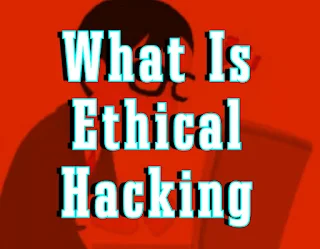Ethical Hacking
What is ethical hacking?
Ethical hacking is a security assessment, in which proactive work is done to increase the security of the organization. With prior approval from the organization or owner of IT companies, the purpose of ethical hacking is opposed to malicious hacking. ethical hacking is done through ethical hacking, known as "white hairs", ethical hackers are security experts who carry out these security assessment activities of an organization or company. Doing proactive work helps to improve the security posture of the organization. With prior approval from the organization or IT asset owner, ethical hacking is the opposite of malicious hacking. Ethical Hackers are working with some of the best and largest companies across industries such as healthcare, finance, government, energy and much more. Government agencies and business organizations today are in constant need of ethical hackers to combat the growing threat of IT security. A lot of government agencies, professionals and corporations now understand that if you want to protect the system, you can't do it just by closing your doors. The main benefit of ethical hacking is to prevent data from being stolen and misused by malicious attackers, as well as:
detect vulnerabilities from the attacker's POV so that weak points can be fixed.
Implementing a secure network that prevents security breaches. Trust organizations and developers to ensure their products and data security.
Ethical Hacking?
It's no big secret that any system, process, location, device, etc., can be hacked. To understand how a hack can happen and what the damage is, ethical hackers must think about how malicious hackers are and know the tools and techniques they will have to use.
Web-Application-Hacking
System Hacking
Web-Server-Hacking
Hacking-Wireless-Network.
What are the main concepts of ethical hacking?
Hacking experts follow four key protocol concepts:
Legal morning. Obtain approval prior to access and conduct a security assessment.
Define the target. Determine the scope of the assessment so that the pirated work remains ethically legal and within the approved boundaries of the organization.
To report nudity. Ensure proper organization of all vulnerabilities found in the assessment. Provide a remediation plan to resolve these vulnerabilities.
Regarding data sensitivity. Depending on the data's sensitivity, ethical hackers may agree to a non-disclosure agreement, in addition to other terms and conditions required by the organization.
How are ethical hackers different from malicious hackers?
Ethical hackers use their knowledge to protect and improve technology. ethical Hackers make sure any organizations for any vulnerabilities regarding the security breach.
Ethical hacking refers to vulnerabilities identified by the organization. Additionally, they provide remediation advice. In many cases, with the consent of the organization, ethical hacking requires re-testing to ensure that vulnerabilities are fully resolved.
Malicious hackers aim to gain unauthorized access to a resource (the more sensitive the better) for financial gain or personal recognition. Some malicious hackers disable websites or crash backend servers for games, causing reputational damage or financial loss. Methods of use and exposures found remain unreported. They do not care about improving security conditions.
What should ethical hackers have in their skills set and, which certifications an ethical hacker should obtain?
They often specialize, subject matter experts (SME) in a particular area within their ethical domain.
All ethical hackers should have:
Expertise in writing languages.
Advanced in operating systems.
For knowledge networking.
A solid foundation in information security principles.
Some of the most recognized and acquired certifications include:
Certified Ethical Hacking Certification
Offense Security Certified Customer (OSCP) Certification
CompTIA Security+
Criminal CCNA Security
SANS GIAC
What problems hacking identify?
When assessing the security of an IT asset(s), ethical hacking aims to play a role in the attacker. In doing so, the passengers seek to strike against the target. The initial objective is to enable the explorers to obtain as much information as possible.
When an ethical hacker collects enough information, they use it to search for vulnerabilities against the target. ethical Hackers used both combination of automated and manual testing to make sure assessment of a sophisticated systems, complex countermeasure technology that can be vulnerable.
They don't stop at revealing the revelations. Ethical hackers use things against vulnerabilities to prove how a malicious attacker exploits them.
Some of the cheapest vulnerabilities found by ethical hackers include:
Injection attack
Broken authentication
Security misconfigurations
Use of components with known vulnerabilities
Sensitive information disclosure
This documentation includes steps to patch or mitigate vulnerabilities found and steps to fix them.
What are some limitations of ethical hacking?
A narrow environment. Ethical hackers cannot progress beyond a specific target to attack. But it is not inappropriate to discuss a potential attack with the organization.
Resource constraints. Malicious hackers do not have the time constraints that ethical hackers often face. Computing power and budget are additional ethical constraints for hackers.
What a way. Some organizations ask experts to avoid test cases that lead to server crashes (eg, denial of service (DoS) attacks).








.jpg)

EmoticonEmoticon